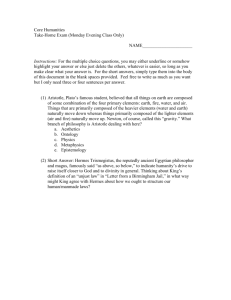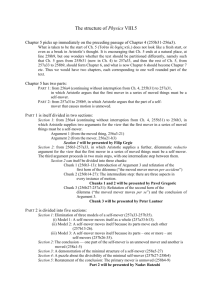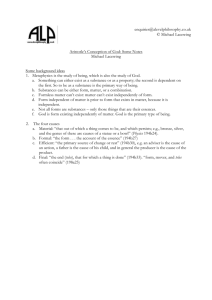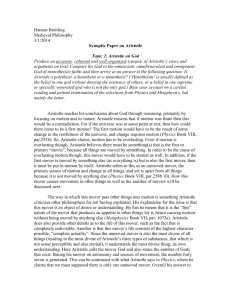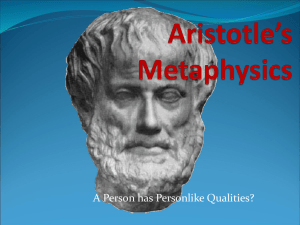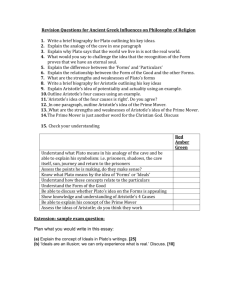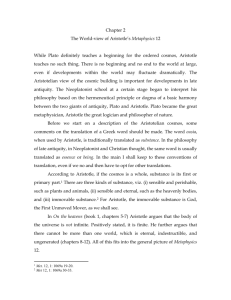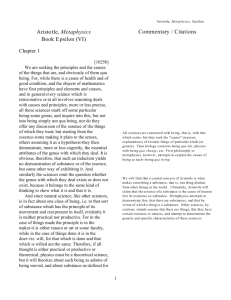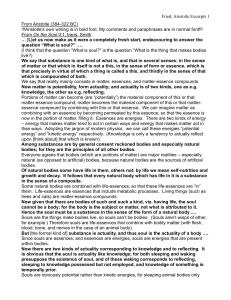Aristotle-Metaphysics
advertisement
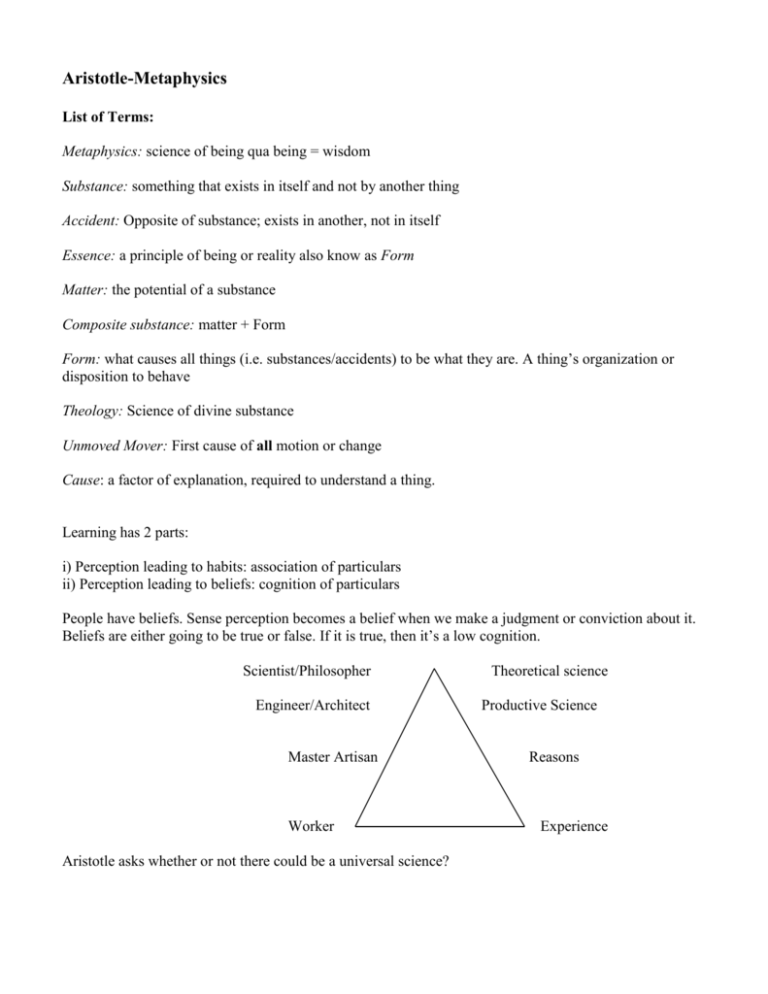
Aristotle-Metaphysics List of Terms: Metaphysics: science of being qua being = wisdom Substance: something that exists in itself and not by another thing Accident: Opposite of substance; exists in another, not in itself Essence: a principle of being or reality also know as Form Matter: the potential of a substance Composite substance: matter + Form Form: what causes all things (i.e. substances/accidents) to be what they are. A thing’s organization or disposition to behave Theology: Science of divine substance Unmoved Mover: First cause of all motion or change Cause: a factor of explanation, required to understand a thing. Learning has 2 parts: i) Perception leading to habits: association of particulars ii) Perception leading to beliefs: cognition of particulars People have beliefs. Sense perception becomes a belief when we make a judgment or conviction about it. Beliefs are either going to be true or false. If it is true, then it’s a low cognition. Scientist/Philosopher Engineer/Architect Master Artisan Worker Aristotle asks whether or not there could be a universal science? Theoretical science Productive Science Reasons Experience Being qua (as) being – insofar as being is (i.e. entities without considerations that distinguishes them) Primary meaning of “to be” is “to be substance”. A tree is a substance, peoples, etc. Substance is the foundation of all other things that are. Every form is a particular “this”. (Ex: Only thing that is the same in two roses is the name we ascribe to it) You living body is a substance. You hand is not so long as it is attached to your arm and body. But if you cut off your hand then it becomes a substance. Difference between Plato’s notion of Form and Aristotle: Plato’s Form: idea of a horse is better than all real horses Aristotle’s Form: have no separate existence. It exists with substances. Present in all matter. So there is no ‘idea’ of horse, for Aristotle, only the category of horse. Fundamentally, being means t be a substance. Things that have no substance only exist through their relation to substance. There are difference Substances (Book 12): Material Simple Perceptible Immaterial Composite Imperceptible HORSE Legs, parts, tails Changing shape FORM Colour (brown, white, etc) Potential to run, eat, skip Form= principle of organization or disposition to behave (i.e. essence) Belief differs from knowledge. Nothing we know is a belief. Belief arises from the senses. They do not have any certainty. Universality/Necessity = always true Knowledge about trees will be grasped when we grasp the essence/Form of it (i.e. that which never changes) No science is a matter of opinion. Aristotle does not believe in the idea of the good. Different kinds of knowledge: 1. General ( knowing the most general things) 2. Difficult (hard to know) 3. Exact, teachable knowledge 4. Purely theoretical 5. Noble, Superior 6. Divine (i) knowledge about divine entities and (ii) kind of knowledge that divine entities have Aristotle’s answer to the question: What is Truth? “To say of what is that is, and of what is not that it is not, is true.” This is known as the Correspondence theory of truth: truth is the correspondence of combinations in substances and statements. Divine/Ultimate substance: is the Unmoved Mover, the cause of all other causes. The complete cause of change includes 4 major factors in explanation: Formal Cause: the essence, the law of the change Material Cause: the material persisting through change Efficient Cause: what starts the change Teleological Cause: the purpose of the change Cosmological Proof of God (Book 12): 1.There exists movement in the world. 2.Things that move were set into motion by something else. 3.If everything that moves were caused to move by something else, there would be an infinite chain of causes. This can't happen. 4.Thus, there must have been something that caused the first movement. 5. From 3, this first cause cannot itself have been moved. 6.From 4, there must be an unmoved mover. Unmoved Mover is a substance, immaterial being that causes all motion.
